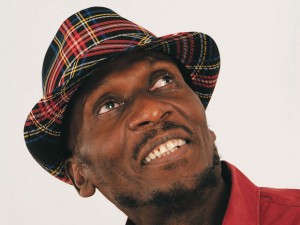“I never get tired of singing Many Rivers to Cross, and you know why?” asks Jimmy Cliff. “Cause I still have many rivers to cross. They’re just different rivers.”
At 64, the original reggae star is back with a new album, Rebirth. It is an outstanding set of uplifting, spiritual songs on which his voice sounds as high, sweet and soulful as ever. Backed, somewhat improbably, by a band of veteran American punks, Cliff captures a tone evocative of his classic Sixties period, and the pop-y, organ-driven sound of ground-breaking hit songs such as You Can Get it if You Really Want, The Harder They Come and Many Rivers to Cross, a song that always sounds like a miracle to me, and is surely one of the greatest pop recordings of all time.
Cliff’s tender, emotionally strained vocal rises through the churchy ambience of a hymnal organ while gospel singers echo his desperate testament to a life of struggle: “I’ve been licked, washed up for years/ And I merely survive because of my pride.” Cliff was just 21 years old when he wrote and recorded it in 1969.
“When I came to the UK, I was still in my teens,” Cliff tells me. “I came full of vigour: I’m going to make it, I’m going to be up there with the Beatles and the Stones. And it wasn’t really going like that, I was touring clubs, not breaking through. I was struggling, with work, life, my identity, I couldn’t find my place; frustration fuelled the song.”
Cliff did not finish the song immediately. “I had the idea but it wasn’t ripe,” he says. At the time, he was working on his second album for Island Records in Jamaica but kept it back from the sessions, because “I don’t think we record ballads that great. So I waited till I got to New York and linked up with [Island founder] Chris Blackwell. We were mixing the record and putting on what we call sweetening, adding overdubs and backing vocals. It was a 15-minute walk to the Record Plant studio, and on that walk I kind of finished the song in my head. It was the last day, the end of the session, the musicians were getting up to go, and I said, “Excuse me, please, I have this one song idea, do you mind to have a listen to it?” And they grumble a little bit, “Ah, we’re finishing,” cause they work off union time. But they gave me a few minutes. I took up my guitar, they gave me a mic and I played the song.” Cliff hums the familiar opening strain. “I started singing, the band came in, and that was it. Once. That was it. And then Chris said, “OK, let’s put this one in to fill out the album.” It became a classic, because everyone can relate to it, everyone at some point asks “Who am I? Why am I here? What am I going to do? ”
Cliff had his first hit in Jamaica in 1962, aged just 14, after walking into a record store and singing a song to producer Leslie Kong. “The way I grew up, it was a big family, so I had to start working early. My father was a tailor. The rest of my family were farmers. I just know singing was what I wanted, and I went and do it.” Blackwell identified Cliff’s potential and brought him to London in 1965. Although it took a few years to break through, a starring role as Jamaican outlaw Ivanhoe Martin in cult movie The Harder They Come in 1972 made Cliff reggae’s first international star.
“It was the first time for all of us to make a movie in Jamaica,” recalls Cliff. “I think we captured a period on the earth, a guy coming to the big city thinking he could make it, a rebel, kind of a freedom fighter. It was the spirit of that time.”
Cliff split from Island Records in the Seventies, when they signed his friend Bob Marley. His career has followed a somewhat wayward path since then, with diversions into soul, gospel and even electro music. The hits dried up but he still performs hundreds of shows a year. “They say video killed the radio star, but me, I say, computer killed them all. The only thing you cannot destroy is live performance. You can record it on your phone, you can watch it on your screen, but there is nothing like seeing the artist in the flesh.”
Still venerated by generations of musicians, Cliff has performed with the Rolling Stones, Bruce Springsteen, Elvis Costello and the late Joe Strummer. It was the Clash frontman who introduced Cliff to Tim Armstrong of US punk band Rancid, the producer of the new record, and the man who reconnected Cliff with his original sound.
“Tim is a reggae connoisseur and he put together a bunch of musicians who really have the knowledge, enthusiasm and energy to play it,” says Cliff. “I was amazed. It made me think there is some value that I have overlooked in what I did. I just let it flow, I wanted to make a complete back-to-the-roots album, the way we used to, live, all of us in a room together. It was a big pleasure.”
A charming, smiling, humble character, Cliff has clearly been energised by his latest recordings. “I set my sights really high,” he says. “I’ve achieved quite a bit, for which I am grateful, I made a few hits, and I pat myself on the back for that, but it’s not all. I still have the burning fire to claim the place I have always seen for myself.” Cliff laughs with delight. “So it’s a good time. But there are still rivers to cross.”
By: NEIL MCCORMIK
From: telegraph.co.uk





